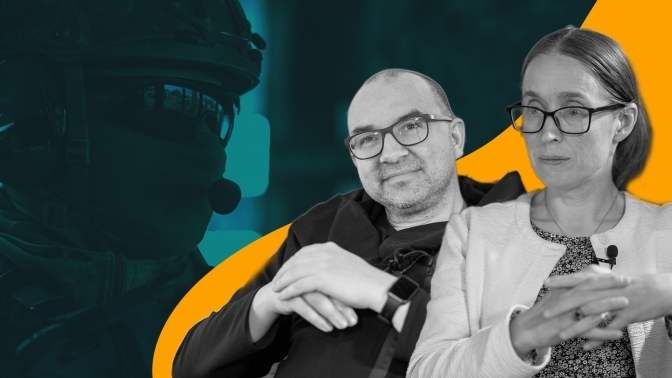
We want to start new conversations where we will discuss the question that probably worries everyone the most and which we cannot see from where we are now or can only guess. But we have a vision of the answer: what is a Ukrainian victory? From the very beginning, some people asked this question. I have read many times in many Western media publications about the importance of having this shared vision. That is why I propose to start with it right away. Today is the 444th day of the great war, the full-scale invasion. Can you see the outlines of the future of Ukraine from this point? What should it look like?
Volodymyr Yermolenko (V.Y.): I think the word «victory» is quite interesting. And some foreign friends have drawn our attention to it. It is not a word that exists in other languages. In the Ukrainian word «victory,» there is this moment of win, of re-victory. That is, you start to be able to do something more.
By the way, the Poles have a word called przemoc, which is very similar in sound, but has the opposite meaning: violence rather than defeat.
V.Y.: Yes. And I think it is a reasonable way to think about it because it’s some classification of internal transformation of each of us and the society itself, how you overcome yourself to a certain extent. There are some things that Ukraine probably needs to overcome. When we think about winning, it is crucial to assume these categories. Everything is associated with the old Ukraine: oligarchy, corruption, narcissism, great localization, and self-centredness – these are a thing that needs to be overwhelmed through this victory.
In the beginning, many people said: «Listen, we’ve only just realized how good this country was.»
V.Y.: It is not bad. It is the feeling of inferiority complex that we have. I hope many of our fellow citizens overcame this complex when they traveled to Western Europe or other countries and saw their qualities and shortcomings. There that we do not have.
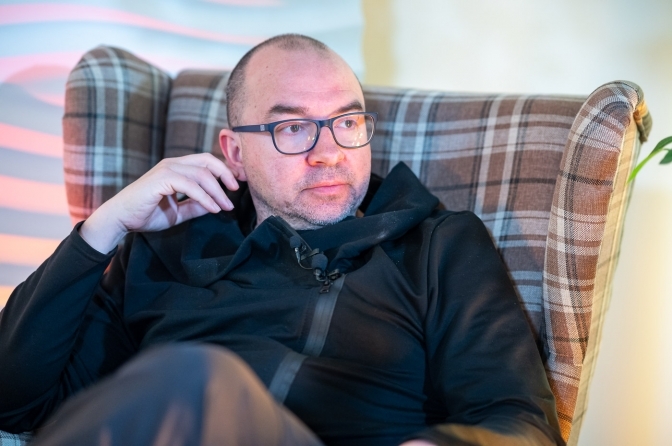
Did I understand you correctly to say that you do not want to return to the topic of a full-scale war now? Is it not enough for us?
V.Y.: What do you mean by «You do not want to return?» We live in an illusion. There are always such metaphors that we take off somewhere and make a leap. It seems, to me, that it does not happen that way. Some changes are more or less irreversible. They involve the work of entire generations, a particular evolution. It was our problem: we wanted radical changes with every revolution. I think we have to think for the long term. In this sense, if we define victory only as the return of territories – it is not enough. It should include some processes. We can discuss which ones.
Tetiana Oharkova (T.O.): It is dangerous to think that the victory will be such a total transformation of society that will lead us to some qualitatively new point that will be better than 23 February 2022, very conditionally. I think we will come out of this war victorious. At least, we hope so. It will be a very bleeding country, let’s face it. It is already a country that has lost many of its best people – military and civilian. This country has already lost many cities, towns, and villages that the enemy destroyed. Our victory will be difficult because Russia occupied 20% of the territory. We do not doubt to liberate these territories. However, Volodya and I often travel to the frontline areas and see how the Russian army turns the lands when they cross through them. It is just hard to describe in words. It is hard to convey through video because you need to show the smell of burning and this atmosphere. It is the end of the world. And in fact, we will come out of the victory very exhausted from this struggle. We do not know how long it will last. And after this point, we have to understand. It is the point where we have to see the future. A country that has lost millions of people, and four or more million have left. We are not sure that all of them will return. There are opinion polls, but today people say: «We will return,» and they say tomorrow: «We will not return.» At this point of victory, we will imagine a future that attracts people who have left here. We will find the strength to rebuild all these villages and towns. And we will need more power to find a common language with these people. First of all, Crimea and these long-occupied territories. We need to find an understanding so that we don’t kill each other. There will be some challenges, and I think we can do it. But I want to make sure that we don’t have rose-colored glasses. We can create a qualitatively new society. It will be challenging. And it seems, to me, that it will be a job for years.
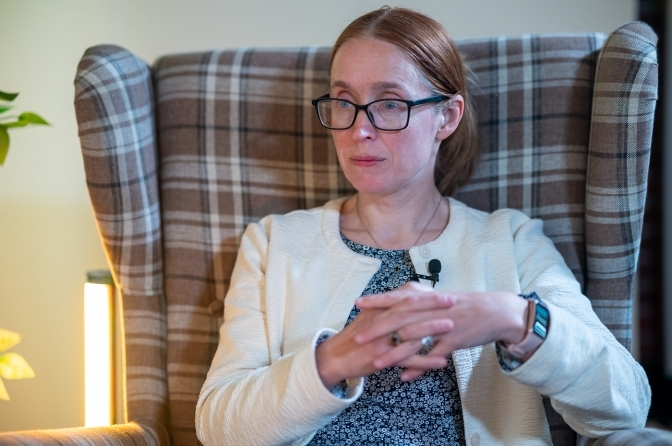
V.Y.: I think it is possible. If you look at Western Europe in the twentieth century, you said that the war was a great tragedy. But there is what they call in France «30 glorious years of reconstruction.» We started talking about Churchill, who lost the election. But why did he lose the election in 1945? Because there was a demand for a different policy, a more left-oriented, Labour-oriented policy. And, in principle, it constructed this new Europe called «the welfare state.» It has become wealthier and more equal than in the first 30 years after the Second World War. It is now Western Europe that has a lot of problems and splits.
T.O.: When we visit Warsaw now, the first thing that comes to mind is that somebody destroyed it...
Absolutely. If you have been to the Museum of the Warsaw Uprising...
T.O.: It is possible to do this. And in order not to remain pessimistic, I would also add that, in addition to facing the challenges, it is also self-evident that Ukraine provides a qualitatively new level for European countries to self-identify. We communicate a lot with foreigners through our work. We see a particular new rank of a country that can prove through its actions what democracy is, the struggle and the price of freedom, sacrifice, and self-sacrifice. It seems there is a certain cohesion around Ukraine that will help us. We have a chance that this will attract some help for reconstruction. It is significant.
We discussed in this studio with Pavlo Sheremeta how to bring back millions of Ukrainians – women, children, and many men who have left, too. And he said there is no other recipe than to create better conditions for them to start here than they will have at that moment there. It is almost unrealistic, but theoretically, we know what to do. I remember that just before the war, I think VoxUkraine surveyed a political compass. They took 1200 respondents, a sociological sample. And without any surprises, of course, it turned out that the vast majority of Zelenskyy’s voters, and even Poroshenko’s voters, are in a very left-wing, almost left-wing zone. They have very high hopes for some paternalistic sentiment, for a firm hand. That is, it was there before the war. Does the war magically change something? Do these people suddenly become «Norwegian-Dutch» or supporters of some liberal models?
V.Y.: The fact that people answer these polls does not mean that they act that way. Ukrainians have some dissatisfaction with the state, and it has always been there. Ukrainians believe that the state owes them a lot. It has not given them enough, so there is a sense of an unfair exchange: I give the state more than it gives me back.
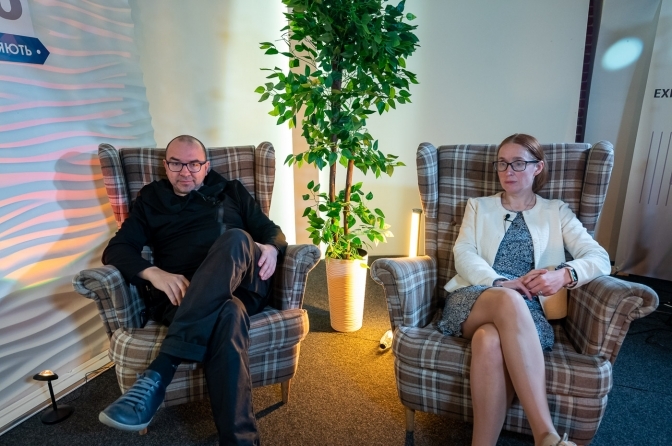
It is interesting. Where did it come from? Does everyone pay that much tax?
V.Y.: Take the whole generation of our parents – these are people who, in their 40s, lost their lives, lost their futures, and were forced to look for some other forms of income in the 1990s. I still think the 1990s shaped us. We can speak on the topic. Of course, they will feel that they gave society more than they received. They believe this is an unfair exchange, they will have this resentment towards the state, and they will be correct. The other thing is how they act.
In the first days of the great war, we saw people constructing barricades in every village and town. In one or two days, Kyiv changed into a fortress city. In April and May, embankments made of anything – bags of earth and sand, began to sprout. The barricades turned into improvised gardens. It is an interesting metaphor. But someone started making them, and not because there was an order. It was possible in every village. Sometimes it made it very difficult for people, mothers with children, to move out. But people felt strong and subjective in themselves. That’s why the way they answer sociologists and what they do can be two completely different realities.
T.O.: This may also be a generational issue. Volodya mentioned it correctly, the generation of people who were 30-40 years old in the 1990s felt that they gave the state more than they received. It is the paternalistic discourse. It still exists mainly among people of retirement age. The further we move into the new generation, the more we see that the ability to give more than receive is gradually becoming more prevalent. There is the ability to make decisions independently, to change their trajectory. It is a different model of society, with less reliance on the state. For five years now, we have been told that people of our generation will most likely not be entitled to a pension. I wouldn’t say that it upsets us that much.
Will we have protests because of raising the retirement age by two years?
T.O.: We think it’s a bit strange, these protests that we will work longer. It seems, to me, that there is a particular gap. But again, we shouldn’t exaggerate. There are some things where we need the state’s help.
V.Y.: It is an essential issue because the question of how we, Ukrainian citizens, will build the state in the future depends on the questions that we, Ukrainian citizens, mostly answer. For Western Europe, after the Second World War, there was a conclusion that Tony Judt writes about very well in his book «After the War. A History of Europe since 1945.» It was published in Ukrainian and translated by Kateryna Zarembo. I advise everyone to read it when it is about the history of Europe. Here’s what he describes: people who reformed Western Europe in the 1940s and 1950s concluded that socio-economic stratification, the rich and the poor, led to Nazism, so it was necessary to reduce this gap through socialist reforms so that everyone would receive a pension, health insurance, and unemployment protection. On the one hand, this seemed to be a good thing, but on the other hand, we built a Western Europe that needs to be more content, where less individual initiative.
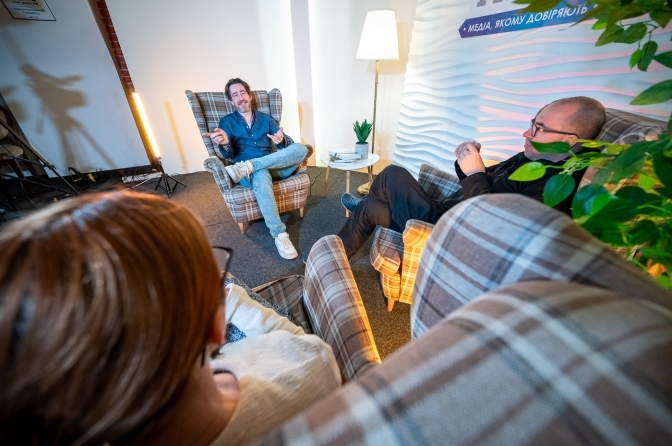
When we think about victory, we understand that the enemy may not disappear. Perhaps this victory will only be a respite. We have the example of France, which allegedly defeated Germany in the First World War, relaxed, and then Germany occupied France. We all know how many months later. Perhaps we need to continue living in this fortress state, where there will be much spending on the army and the military-industrial complex. Then there will be no money for social programs. Then we say to our citizens: «My friends, we provide you with security, and you can do as you please in the economy.» There should be maximum economic libertarianism or something like that. Maybe we need to build such a society.
T.O.: If we are still moving towards victory, and in general, we were able to survive at this moment, it is because the vast majority of Ukrainians were able to give more than they received. It is not a society of exchange. This idea of «well fair» is based on the notion of exchange: the state gives me this, and I give it this in return. We survived miraculously because a critical number of people were able to sacrifice. This understanding of sacrifice and donation is at the center of our victory. We pay taxes. Every Ukrainian considers it necessary to donate to the army or do something similar to the best of their ability. So far, there is a significant imbalance, an asymmetry in what we give for the sake of some higher goal. It is a very archaic model. We provided a lot for the opportunity to hope for victory. And, unfortunately, if the danger of this aggressor does not disappear, we will have to continue to do so. For how long? How long can this central idea keep us going and make us sacrifice? It is very literal. Many families have sacrificed the most precious things: husbands, sons, and children died. Some people have sacrificed more than 15 months to be at the front. Some people donate large sums of money. Some people donate the last, although it may be in small amounts. So this is a society of giving. We gave ourselves, our time, and our resources to the concept of Ukraine, to this country, to win. And this is still going on. But the question is how long it can last. It’s not normal, but it’s the way it is now, and that’s why we’re still standing.
I think Mykola Riabchuk said that this war is, to a certain extent, a postponed war of 1990-1991. It could have started back then. I looked at Kendzier’s archival records about how they declared independence on 24 August and December 1991. They went with a large delegation to negotiate with the Russian Black Sea Fleet. And I would not say that they were very well received there. They threatened us. They said: «We took an oath to another country, and this country has its capital in Moscow.» It was not an option that we could do it differently.
I say this because we have had several turning points in history when we had to defend this independence. It includes 1990 – the student hunger strike, the Revolution on Granite, 1991, 2004, 2005, and 2014, when we became an independent state and began to gain some subjectivity and separateness from Russia. In this concept, it is apparent that this is also a continuation of the same thing. It’s just that this is a delayed war that has finally broken out. The biggest mystery in this war is that all the polls showed that Ukrainians don’t seem to care about language, army, or faith, at least as the election results demonstrated. Probably, they were also interpreted in their way in the Kremlin before the war, before making this fateful decision. But all the polls showed that the issue of independence is essential to Ukrainians – more than 80% across the country, absolutely all strata, regardless of education or gender. Although, there was a slight correlation between the east and south. But no one was prepared for Ukrainians to fight. Just before the war, I read an incredibly skeptical opinion piece on NV by Ivan Verstyuk, who wrote that Ukrainians would fight for avocado salad because we had it. Like, we’re hipsters or something... What are you writing, man? But maybe this was also a motivation for someone. I am trying to understand what is in this independence. If people are ready to fight for it, it means high expectations. Understanding it is the key to what victory is.
T.O.: I think that the key to understanding what Ukrainians are fighting for is not so much in the word «independence» as in the «freedom,» «will,» and the phrase «right to life.» The face of the aggressor that we saw was apparent from the first seconds, minutes, days, and weeks of this war. It is the nature of this war. We saw, with our own eyes, what this aggression means. It is a war that is openly genocidal. Despite the first strikes, which may have been for military purposes, they quickly turned to destroy everything Ukrainian. We have no choice, and this is felt well by people who may not even be able to articulate it and who do not use the word «independence.» It is just a desire to survive. If we want to live, we have to fight them. It is a fight for life rather than independence. If we want to be, we must win this war.
And then, of course, we saw the attitude towards our own. We see huge sacrifices on their part, which, however, do not stop them, the attitude towards civilians, and the value of human life, which is minimal. What the military tells us when they are in the hot spots in Bakhmut is terrifying. They say that Bakhmut is covered with bodies. It is something that should frighten, but it does not scare anyone. The value of life for Ukrainians is higher than the value of life for Russians. The unwillingness to be in this other paradigm makes Ukrainians speak and fight. And the issue of language has become significant. We see an enormous number of people switching to Ukrainian after the invasion. We see this 73% of people who voted for Zelensky in 2019 against the slogan «Army. Language. Faith» slogan. Now we see Zelenskyy as president talking about the army and language. All these processes that have begun against the Moscow Patriarchate are apparent. They are happening now under Zelenskyy. Ukraine is a state or country where the circumstances, people, and situations determine the agenda, not the president. Therefore, today there is no contradiction in the fact that Zelenskyy laughed at it in 2019. He does not say so explicitly, and now become his political slogan.
V.Y.: Yes, it is a paradox that both Zelenskyi and Poroshenko have backgrounds called anti-Ukrainian or a little rotten. But the question here is not what people think at a particular moment. The question is where they are heading and what the trend is. If you look at me and Tanya, we also come from the Russian-speaking environment in Kyiv, and we also switched to Ukrainian only at a certain point connected with the birth of our children. It was a conscious decision that our children would speak Ukrainian. That’s why it’s a little easier for us to come to Kharkiv, Dnipro, and Odesa, talk to people who may not understand the need for this transition, and say: «Listen, we are just like you. We are also going through this journey. We are also at a certain distance.»
But what are Ukrainians fighting for? For freedom, no doubt. And again, appealing to our foreign friends, because sometimes they catch something interesting. Recently, I talked with my friend, and he said the main Ukrainian word was «will.» It is also not entirely the same in other languages because it combines will and freedom. Willpower gives freedom. And this, by the way, was very well understood by our writers, such as Lesya Ukrainka.
Should Lesia Ukrainka have translated Nietzsche? We would have seen what he did.
V.Y.: Nietzsche did not even feel this. German does not have this, but we do. Even if Lesya Ukrainka has not. For example, I constantly quote Marko Vovchok, who was skeptically regarded in the Ukrainian tradition because she was not an ethnic Ukrainian. She was born in Russia, was a Ukrainian-language writer, and then switched to Russian. But she has some very subtle things in her stories like «Institute» or «Kozachka,» where a woman-not, but even man-values freedom more than anything else. That is, life without freedom means nothing.
The second point is the theme of violence. Ukrainians feel that Russia is a country built on violence, not only external but also internal. I think that a big motivation for many of these soldiers to go to war is that they are being «bullied» at home, for lack of a better word. It is domestic violence. And in this time that we, Ukrainians, live in, the space for violence is shrinking. It is good.
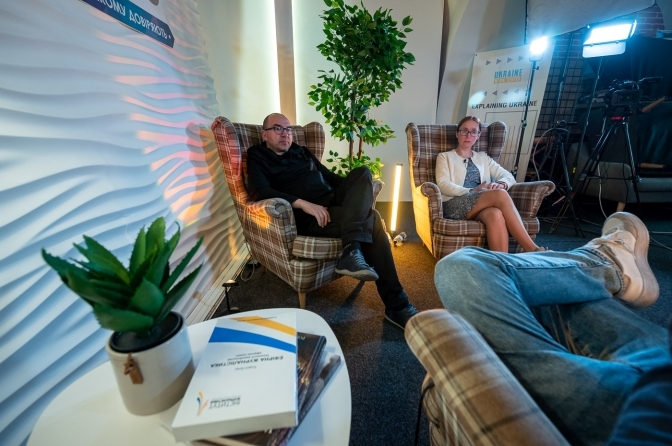
And even though the historical trauma is extensive, everyone’s subcortex wrote it.
V.Y.: We travel around the frontline and are surprised. You might expect some tension from soldiers, our military at checkpoints. But there is much politeness and humor. That is what we notice.
T.O.: There is some normalcy. When we talk about violence, it can be present in any society, including European ones. For example, we often hear about demonstrations in France, about police actions that are sometimes not very symmetrical. What is the fundamental difference with Russia? There is an outright normalization of violence, spreading it throughout society. It includes domestic violence, spousal violence, and violence in prisons and detention centers. In general, the fact that Prigozhin recruits them. There is less of a problem because now the regular army takes these prisoners. Prisoners who fight are a kind of quintessence of this society. Prisoners who are in this topos of violence are going to war, and they are being disposed of elsewhere. I think that Ukrainians are aware of what is coming. It is a society where you are nobody, where violence is normalized, and where there is no freedom, will, nothing. And Ukrainians feel it very well. Since the first days of the war, it has been Bucha, Irpin, what we saw in the east, Izyum, and Kherson. This torture... The physical destruction of the nation is coming. People will react. They will see the light.
It is the transformation of centers of civilization into the wild steppe. We see in the east, just some direct analogies with the twelfth century.
V.Y.: This is something that constantly shocks us in this war. We come to Izyum, and there are two five-story buildings on Pershotravneva Street. Several dozen people died in each of them. They are buried in a cemetery, in a pine forest on sandy soil. You realize the Russians simply decided to throw a bomb there that penetrated the bomb shelter. Most of these people died in the concrete basement. You understand why. They know that this is a house where people live. We see the same thing in Borodyanka. It is the motivation behind the rocket attacks on civilian homes. Sometimes you realize that they just missed because there was an object there. Sometimes it is old maps. And sometimes you don’t understand. In Dnipro, they hit a civilian house... More than 30 people died.
T.O.: 45 or 46.
V.Y.: Or in Sloviansk. We were there recently, two days before Easter. It is an entirely civilian space, with five-story buildings and no military facilities.
It is a kind of quintessence of evil. Russians explained it by «Because we can do it.»
V.Y.: Yes. We talked before the interview about our General Zaluzhnyi. He formulated it very nicely in an article in December 2022 that the center of gravity of this war is a sense of impunity. The Russians are doing this because they want to say: «We can do it, and we will do it.» And we have to stop this, of course.
T.O.: «We can do it because no one will punish us.» In many of our conversations, we insist that there is something in the Russian mentality that is very much rooted in this sense of impunity, in this broken connection between crime and punishment. This crime without punishment that we see in Dostoevsky’s novel: Raskolnikov, «Whether I am a trembling creature or a righteous man»... Why does he kill this poor old woman? Because he wants to assert himself as a subject through this murder. Of course, at the end of this story, we see promises of redemption from punishment. And there is this broken connection between crime and punishment. They commit crimes only because they can. And they will stop doing it as soon as they can not.
V.Y.: There is something sadistic in this «We can do it again.» When we talk about victory, it means, that we can master our space, build a house, and launch a start-up – this is what the word «victory» means. But for them, it’s «we can do it again,» meaning that you can only do it if you are capable of violence.
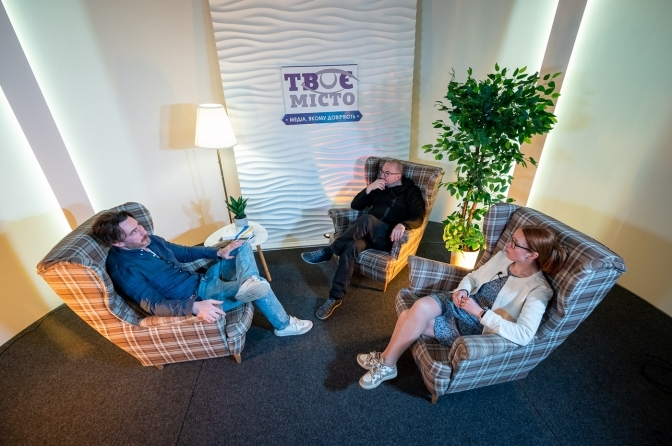
A deviation is a kind of norm. Roman Kechur, a psychiatrist from Lviv, explained it very well: it is usual to say that I hate you because you are my enemy. It is normal to wish you dead because this is still the limit of the norm. But if you desire death for someone who does not like you, that is already beyond the normal. Russians are guided by their hatred of Ukrainians very often.
T.O.: This is the logic of revenge. The first blitzkrieg hoped that they would come in, that we would meet massive tank columns with flowers and bread. It was such a misunderstanding. And then, when they saw that this did not happen, that Ukrainians were resisting, it became revenge violence: «Yes, that’s what you are! We will exterminate you because you don’t like us, don’t want to be like us, don’t want to assimilate.» These are all the practices of assimilation...
V.Y.: It’s like Nastasya Filippovna throwing money into the fire. It is a nihilistic moment. That is, if you are not mine, you are nobody’s. But we talk a lot about Russia. Let’s get back to Ukraine – we shouldn’t idealize ourselves. We are sometimes in a certain blindness now, and it is dangerous. We are on the good side – Ukrainians are great. But this is not always the case. We need to understand this climate of violence because it exists here when our social networks turn into shooting at our people. All these endless bickering and attempts to «silence» someone, to destroy them morally for other views, other actions with which you disagree. I am concerned. The war unites, but it also divides on a grand scale, and not so many views as experience, not so much what you think as you do, where you are. Geography and experience divide. And if we enter into this war of all against all – and this is our eternal problem, as Panteleimon Kulish described it – we can merely destroy ourselves.
We remember when Finland had a civil war, and then Russia attacked. It would be wrong to repeat this in reverse.
V.Y.: Yes, victory can become defeat. For example, after the Second World War, Germany and Japan became successful countries because they turned defeat into victory. But it can also happen the other way around.
Or there is an example that I often cite. I am afraid of. It is Afghanistan, a country that defeated the three largest empires but lost to the Taliban...
V.Y.: Or Bosnia. We have to understand that there are different outcomes. We are striving for victory now, and I am sure we will achieve it. I don’t know if you watched the 9 May parade in Moscow (Laughs). I watched it out of the corner of my eye. If the previous parades were such pandemics, causing some horror and disgust. This one was just laughable. It’s a very comical story with toy dances, cars, frightened, old and weak people...
When the devil becomes funny, he loses.
V.Y.: Yes. This version of the empire is weak. Ukraine is a sequence of barricades, and even if you destroy one embarkment, all the others will remain standing. And Russia is a house of cards with a magic card somewhere, and if you pull it out, everything will fall apart. But this does not mean that it will not transform. Russia was already falling apart after the First World War, but the Bolsheviks came in and rebuilt everything with blood. So we have to understand this too.
T.O.: Yes, and to think about what will happen to us even after the victory. How we, as a society, will build the foundation of common life. How we will reduce these gaps in the experiences that people have had, people’s experiences during the war can be very different: someone was abroad, in the rear, at the front. Someone gave the most precious, and someone gave less. We have to find this common denominator and stop destroying our own. The past will divide because war is an experience that scattered families. We need to see a common future in all of this, stick together, and find an additional hundred percent of strength to rebuild. It is an extreme amount of resources. We also need to not quarrel with each other because help also depends on it. We will not be able to rebuild without outside help. No country can. We will need huge resources and an enormous amount of money – whether it is Russian assets. Our foreign partners have to give them to us or direct assistance – all of this will be necessary. We need to be together and find a common language to achieve it.
Let’s imagine the liberation of the territories – not only Lysychansk and Sievierodonetsk but also Donetsk, Luhansk, and Sevastopol. We will build rules for coexistence and how people will vote. There will be a massive amount of work to be done. And it will be disappointing and painful if we win this war at such a giant cost, in the sense that we reach the internationally recognized borders. Then it turns out that we have to rebuild the country. Not only to physically rebuild cities and villages, but we will not be able to survive as a society. And it will be a disaster. So we have to start thinking about this now.
Translated by Yulian Lahun
Follow us on Facebook and Instagram. Lviv Now is an English-language website for Lviv, Ukraine’s «tech-friendly cultural hub.» It is produced by Tvoe Misto («Your City») media hub, which hosts regular problem-solving public forums to benefit the city and its people.












